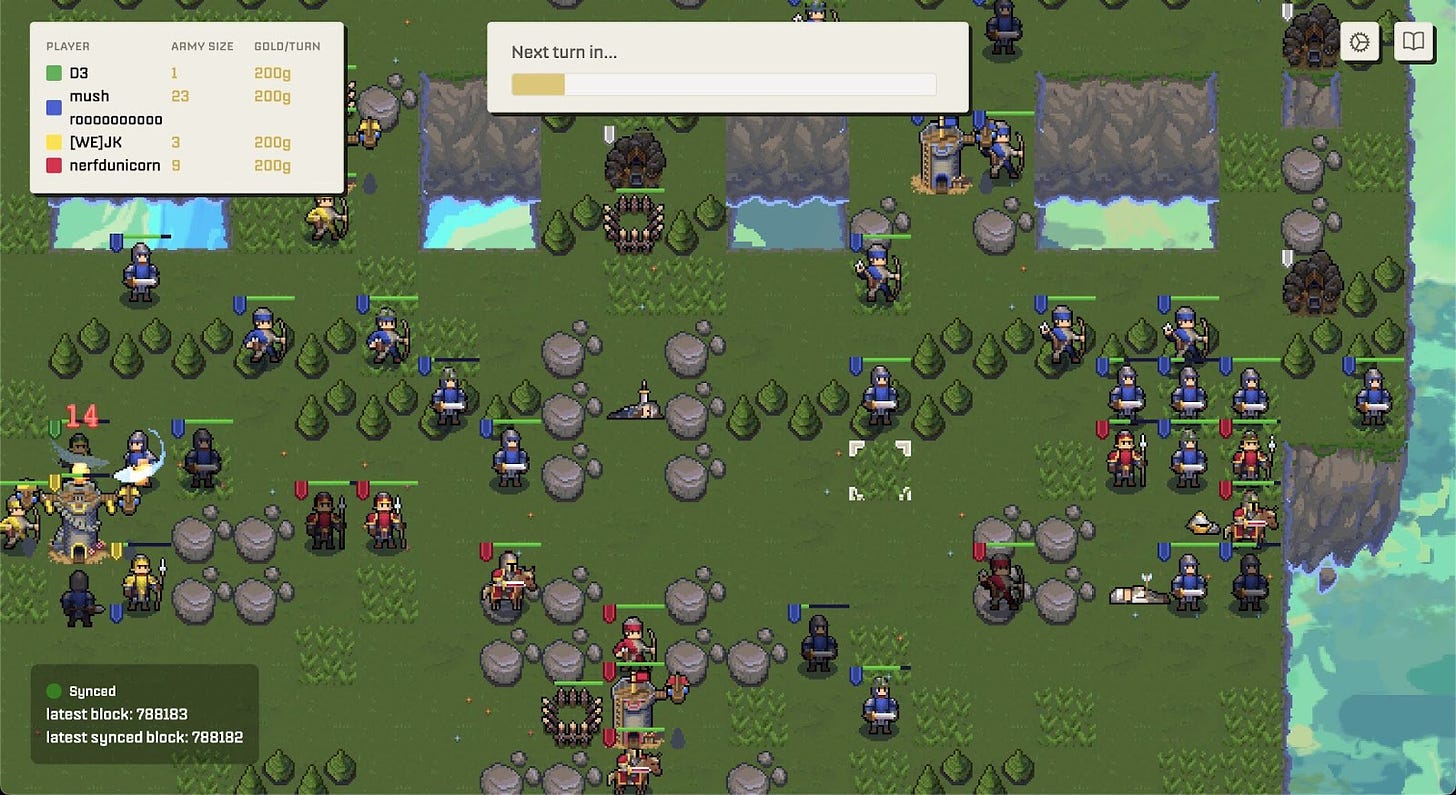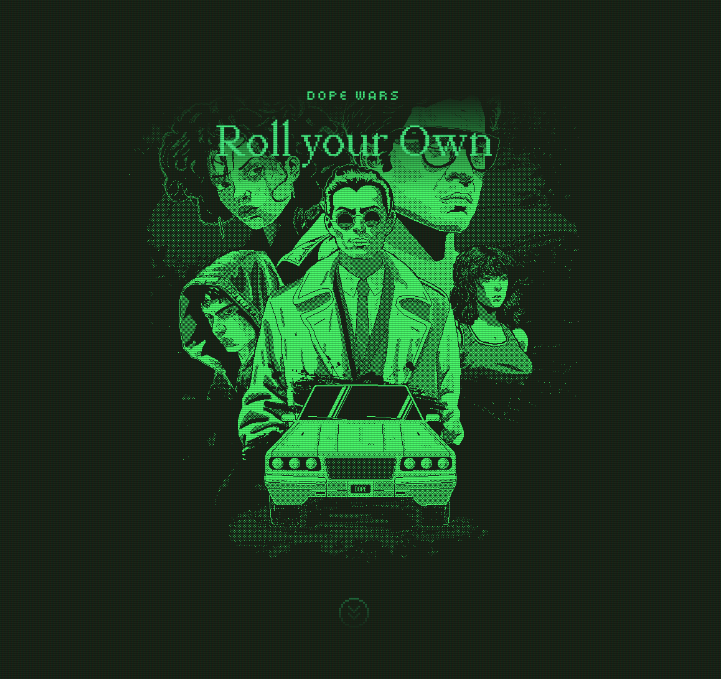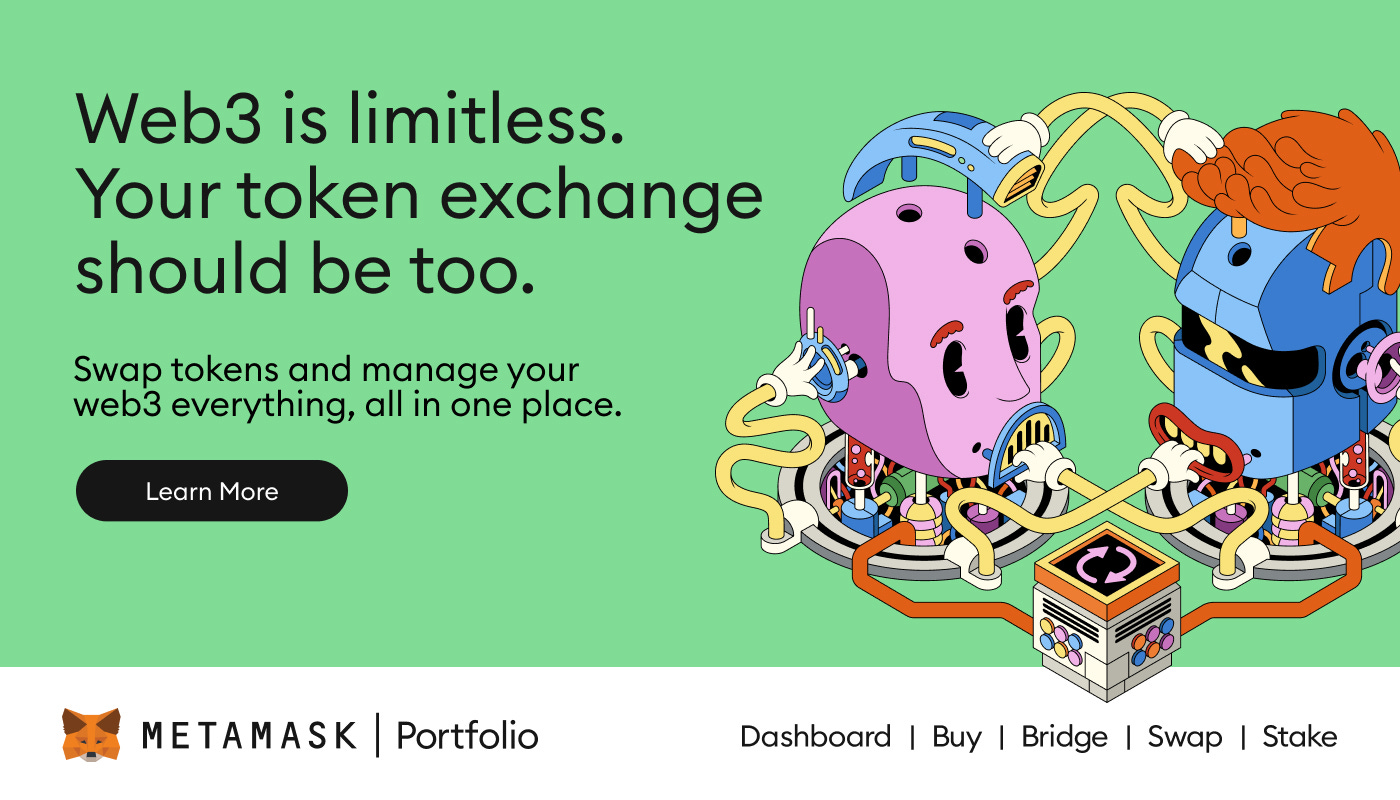Metaversal is a Bankless newsletter for weekly level-ups on NFTs, virtual worlds, & collectibles
Dear Bankless Nation,
We just ran an article Starknet’s Onchain Gaming Oasis!
The piece got me thinking about my Autonomous Worlds post from earlier this year and the underlying “engines” that make this sort of totally onchain gaming possible.
For today’s post then, let’s do a follow-up highlighting some of the main onchain game engine efforts in action today!
-WMP
🦊 Goodbye complicated exchanges. Hello simple swapping. 🦊

Onchain games are games where the core logic, rules, assets, and state are stored directly on a blockchain, most commonly Ethereum or Ethereum Virtual Machine (EVM) networks so far.
Unlike traditional offchain games or hybrid games, every action, transaction, and progression in a totally onchain game is recorded on the blockchain. This approach caters to a series of value propositions, namely:
-
🙌 Ownership — Players truly own their in-game assets, which can be traded, sold, or used across different games as NFTs.
-
🔍 Transparency — All game rules and mechanics are open and verifiable by anyone, ensuring fairness and allowing third-party builders to create unique experiences on top of the core game.
-
🔃 Interoperability — Assets and progress can be used across multiple games or platforms.
-
🪙 Economics — Players can earn real-world value through cryptoeconomic gameplay, turning leisure time into potential profitable opportunities.
-
🌌 Decentralization — Games are not controlled by a single entity, and players can more readily partake in the governance processes of the games they’re interested in.
🏹 Settle, Hunt, Claim, Repeat.
Be more bankless and become a Bankless Citizen today!
Onchain game engine projects come in different shapes and sizes, so to speak. For example, some are open-sourced and cater to an ecosystem of games, while others are proprietary and custom-built to power a single game.
To help you get a better handle on the basics of this scene, below I’ve listed some of the main onchain game engine efforts you should be watching going forward as they stand to shape the near future of blockchain-based gaming experiences…

The 101: Lattice is a team building MUD, an open-source framework for developing onchain apps that’s suited for games and beyond. More onchain games are built on MUD than anywhere else right now.
The big picture: MUD offers game developers a flexible toolkit for easy onchain game creation. With its “Store” mechanism it provides a ready-to-use, secure storage for game data, eliminating the need to build one from scratch. Meanwhile, “World” manages how different game parts interact with this data, streamlining the development process and letting devs focus on gameplay.
Example games: OPCraft, Skystrife, Kamigotchi
Additional resources: MUD docs, Lattice website

The 101: Steered by tarrence.eth and other elements of the Starknet gaming community, Dojo is a game engine and tech stack tailored for facilitating autonomous world games on Starknet.
The big picture: Dojo utilizes Cairo, a cutting-edge language designed for allowing vast computations to be compressed into single proofs. As such, the engine’s adaptability and efficiency make it a powerful choice for developers aiming to create intricate and transparent gaming experiences on the Starknet L2.
Example games: Roll Your Own, Influence
Additional resources: Dojo Docs, Dojo website

The 101: In development by Argus, the World Engine is being designed as a sharded rollup stack for powering and scaling onchain games.
The big picture: The World Engine is set to be an L2 + game engine combo centered around a base shard that can support many individual, customizable game shards. Here, note that the creators have previously hinted at “location-based” shards, which could function similarly to regional servers.
Additional resources: Argus website, Argus Twitter

The 101: Created by the Curio team, Keystone is a rollup framework built on the OP Stack that’s designed for facilitating high-performance onchain games.
The big picture: The Keystone L2 framework is founded upon a “high tick rate” game engine that specifically caters to powering real-time strategy games, e.g. titles like Age of Empires. It will support various data availability (DA) layers, starting with Celestia.
Example games: Treaty, Warcraft
Additional resources: Curio blog, Curio Twitter
Of course, along with the more popular onchain game engines already covered above, there’s a vibrant array of additional projects pioneering in this sector as well.
For instance, Paima Studios is a game studio working on the eponymous Paima, a unique framework designed to craft L2s specifically for gaming experiences. Playmint is another innovative studio developing around “client side proofs,” a novel approach to onchain game mechanics.
Other teams that are specifically building out their own bespoke engine architectures are Topology, a Starknet-based team focused on digital worlds a.k.a. “onchain realities,” and Pirate Nation, an onchain RPG whose “mirroring” technique allows it to seamlessly link L2 activities with its L1 Founders Pirates NFTs.
While, to be sure, there are more onchain game engine projects than are noted here in this article, the ones highlighted above serve as prime examples of the current flurry of innovation happening around the blockchain and gaming crossroads right now. If the next era of gaming really is upon us, engines like these will power the way ahead!
William M. Peaster is the creator of Metaversal — a Bankless newsletter focused on the emergence of NFTs in the cryptoeconomy. He’s also a senior writer for the main Bankless newsletter.
A Bankless Citizen ⚑ turned $264 into $6,077 last year. A 22x ROI 🚀 in a bear market!
MetaMask Portfolio houses our flagship swapping mechanism. The Swap feature allows you to swap tokens directly by aggregating data from various decentralized exchanges (DEXs) and market makers to ensure you get competitive prices and low network fees.

Not financial or tax advice. This newsletter is strictly educational and is not investment advice or a solicitation to buy or sell any assets or to make any financial decisions. This newsletter is not tax advice. Talk to your accountant. Do your own research.
Disclosure. From time-to-time I may add links in this newsletter to products I use. I may receive commission if you make a purchase through one of these links. Additionally, the Bankless writers hold crypto assets. See our investment disclosures here.
#Onchain #Game #Engines #William #Peaster




